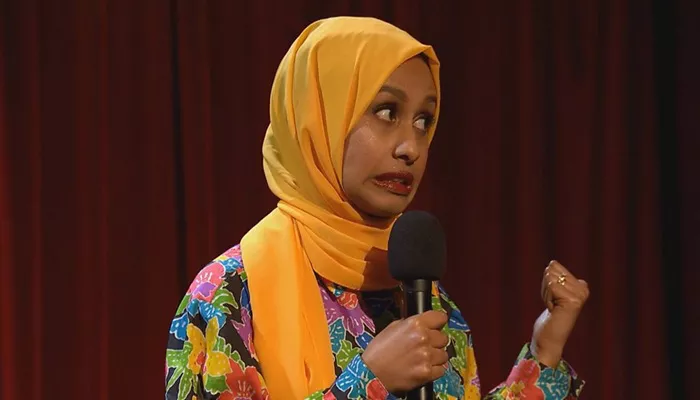London-based stand-up comedian, writer, and actor Fathiya Saleh is quickly becoming a name to know in the comedy world. In just six years, her sharp wit, honest storytelling, and relatable humour have earned her a growing international fan base.
Saleh’s comedy explores themes such as life in a Somali-Yemeni household, navigating relationships, and personal topics like her receding hairline as a hijab-wearing woman. Her performances are filled with cheeky humour and cultural reflections that resonate with many.
Since stepping into the comedy scene, Saleh has performed in Saudi Arabia, Egypt, Sweden, and across the UK. She has appeared on major line-ups including BBC Asian Network and Latitude Festival. Recently, she was highlighted in Service95, Dua Lipa’s global newsletter, as one of “5 Artists Bringing a Fresh Perspective to the Comedy Scene,” praised as “one of the most underrated yet exciting performers.”
Outside comedy, Saleh works as a youth worker in London, where she helps educate and inspire young people. Her dual role as a comedian and mentor allows her to connect deeply with diverse audiences, both Muslim and non-Muslim, offering them a space to laugh, learn, and reflect.
In an interview with Amaliah, Saleh shared her journey into comedy, her experience as a visibly Muslim performer, and her aspirations for the future.
Growing Up in a Funny Household
Saleh traces her love for comedy back to her childhood. “Everyone in our home was funny,” she said. “As the youngest sibling, I got teased a lot. We made fun of everything—nothing was off-limits.” Her early influences included watching comedians like Dave Chappelle and Bernie Mac with her brothers, even when she was probably too young for their content.
First Steps on Stage
Saleh first performed stand-up while studying for her Master’s degree at Goldsmiths University. “It was during a student union event,” she recalled. “I met people in the comedy society and thought, ‘Why not?’ I had been considering comedy, but never had a chance until then. That moment felt like a sign.”
Navigating the Challenges
Balancing a career in comedy with a full-time job and family duties hasn’t been easy. As a visibly Muslim Black woman, Saleh acknowledges facing barriers in the industry. “There’s a glass ceiling related to race and gender,” she said. “But hard work does lead to results.”
She also faces online trolling. “It’s upsetting to see how harsh we can be to each other as an Ummah,” she noted. “If you truly follow Islamic values, it should show in your actions. We should treat each other with kindness because we’ll be accountable for our words.”
Still, Saleh remains grounded in faith. “Sometimes I feel lazy and think, ‘Yawm Al Qiyamah is coming,’” she joked. “But I’m tying my camel and making plans for the future.”
The Joy of Making People Laugh
One of the best parts of her job, Saleh said, is the feedback from audience members. “When someone says, ‘I had a bad day and you made me laugh,’ or ‘I really related to what you said,’ it means so much,” she shared.
Comedy Inspirations and Writing Style
Much of her inspiration comes from her mother, whom she calls both hilarious and brutally honest. “She’ll tell you if your breath stinks,” Saleh said. “It’s toxic, but funny. I think it’s a Somali thing—there’s no filter.”
She also credits her close friends for keeping her sense of humour sharp. Her writing process is casual and organic. “If something funny happens, I’ll write it down,” she explained. “Sometimes it turns into a joke, sometimes not. If I say something that makes my friends laugh, I might use it on stage.”
Career Highlights
Saleh’s career has already taken her to international stages, including Saudi Arabia, where she combined work and spirituality by taking her mother on Umrah. She has performed in Cairo and toured the UK as part of the “Muslim Comedy Queens” tour, alongside comedians like Ola Labib, Shazia Mirza, Zain Comedy, and Yasmin Elhady. The tour even sold out London’s O2 Indigo venue. “Not the big one,” she laughed, “but Insha Allah, one day!”
Facing Industry Gaps
While progress has been made, Saleh believes more representation is needed. “We’ve come a long way,” she said. “But when you compare the number of Muslims in comedy to non-Muslims, we still have work to do.”
Looking Ahead
Saleh is now focused on creating more comedy content and skits for social media. “I haven’t used social media to my advantage yet,” she admitted. “But it’s a great way to grow your audience. You can be booked and busy with or without it, but visibility helps.”
She also hopes to perform a full hour-long show and do more writing. “I worked on Bad Education with Jack Whitehall last year, and it was a lot of fun. I’d love to do more projects like that.”
Advice for Aspiring Muslim Women in Comedy
For Muslim women who want to try comedy, Saleh’s advice is simple: “Just do it. You might not be great the first few times, but that’s okay. You learn by doing. Be brave, even if it’s scary.”
She added with a laugh, “If people don’t laugh, just say ‘suck your mom.’ I’m joking!”
Final Thoughts
Saleh closed the interview on a reflective note. “God is great. That’s it. He always has a plan. You just have to trust the process.”

